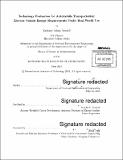Technology evaluation for automobile transportation : electric vehicle energy requirements under real-world use
Author(s)
Needell, Zachary Adam
DownloadFull printable version (11.74Mb)
Alternative title
Electric vehicle energy requirements under real-world use
Other Contributors
Massachusetts Institute of Technology. Department of Civil and Environmental Engineering.
Advisor
Jessika E. Trancik.
Terms of use
Metadata
Show full item recordAbstract
In recent years, an increasing number of electric vehicles (EVs) have become available for purchase to nieet personally operated vehicle (POV) travel needs for a certain subset of drivers. Many in the climate change mitigation research community envision EVs as a major potential tool in reducing carbon emissions from the transportation sector, as EVs do not produce direct emissions during their use. Limitations of current EV technology, specifically limited range and high production costs, are recognized as constraints on the market share of EVs, but estimates vary as to the true adoption potential of current technologies. Many suggest that EVs should be targeted to drivers in cities, where the shorter driving distances and slower speeds allow EVs to meet more existing demand, but that conclusion remains relatively untested. It is also unclear whether focus on designing EVs for city use will allow for the greatest possible emissions reduction as vehicle batteries improve. This thesis presents a detailed POV energy use model that both accurately considers driving behavior and vehicle performance on a second-by-second level and on a macroscopic regional and national level, using over 100,000 GPS velocity histories, over 1,000,000 travel survey trip records, and a national database of hourly temperature readings to inform the results. We find that existing EV technology, based on the example of the relatively affordable Nissan Leaf, is able to replace 87% of all vehicles in the US on a given day without mid-day recharging. Our results support the conclusion that current EVs are most suited for urban use, finding higher EV adoption potential and greater prospects for EV-related reductions in gasoline consumption in all of 12 cities studied than the national average, with especially good performance in sunbelt cities such as Los Angeles and Phoenix. However, we find that-under a scenario of improved batteries-reductions in gasoline consumption would be increased by focusing on rural areas rather than urban ones.
Description
Thesis: S.M. in Transportation, Massachusetts Institute of Technology, Department of Civil and Environmental Engineering, 2015. Cataloged from PDF version of thesis. Includes bibliographical references (pages 109-115).
Date issued
2015Department
Massachusetts Institute of Technology. Department of Civil and Environmental EngineeringPublisher
Massachusetts Institute of Technology
Keywords
Civil and Environmental Engineering.